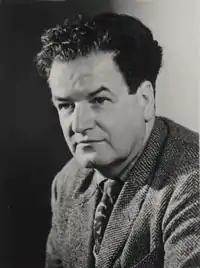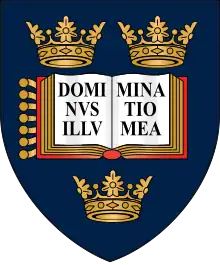Christopher Hill (historian)
John Edward Christopher Hill (6 February 1912 – 23 February 2003) was an English Marxist historian and academic, specialising in 17th-century English history. From 1965 to 1978 he was Master of Balliol College, Oxford.
Christopher Hill | |
|---|---|
 | |
| Born | John Edward Christopher Hill 6 February 1912 |
| Died | 23 February 2003 (aged 91) Chipping Norton, Oxfordshire, England |
| Nationality | United Kingdom |
| Spouse(s) | Inez Waugh (née Bartlett) Bridget Irene Mason (née Sutton) |
| Children | Four |
| Academic background | |
| Education | St Peter's School, York |
| Alma mater | Balliol College, Oxford |
| Academic work | |
| Discipline | Historian |
| Sub-discipline | 17th-century English history |
| Institutions | All Souls College, Oxford University College of South Wales and Monmouthshire Balliol College, Oxford Open University |
| Notable students | Brian Manning Partha Sarathi Gupta[1] |
| Influenced | Ervand Abrahamian[2] |
Early life
Christopher Hill was born on 6 February 1912, Bishopthorpe Road, York, to Edward Harold Hill and Janet Augusta (née Dickinson). His father was a solicitor and the family were devout Methodists. He attended St Peter's School, York.[3] At the age of 16, he sat his entrance examination at Balliol College, Oxford. The two history tutors who marked his papers recognised his ability and offered him a place in order to forestall any chance he might go to the University of Cambridge.[4] In 1931 Hill took a prolonged holiday in Freiburg, Germany, where he witnessed the rise of the Nazi Party, later saying that it contributed significantly to the radicalisation of his politics.
He matriculated at Balliol College in 1931. In the following year he won the Lothian Prize,[4] and he graduated with a first-class Bachelor of Arts degree in modern history in 1934. Whilst at Balliol, Hill became a committed Marxist and joined the Communist Party of Great Britain in the year he graduated.[3]
Early academic career
After graduating, he became a fellow of All Souls College. In 1935, he undertook a ten-month trip to Moscow, Soviet Union. There he became fluent in Russian and studied Soviet historical scholarship, particularly that relating to Britain.[3] After returning to England in 1936, Hill accepted a teaching position as an assistant lecturer at the University College of South Wales and Monmouthshire. During his time at Cardiff, Hill attempted to join the International Brigade and fight in the Spanish Civil War but was rejected.[4] Instead, he was active in helping Basque refugees, displaced by the war.[3] After two years at Cardiff, he returned to Balliol College in 1938 as a fellow and tutor of history.[3]
War service
Following the outbreak of the Second World War, he joined the British Army, initially as a private in the Field Security Police.[5] He was commissioned as a second lieutenant in the Oxfordshire and Buckinghamshire Light Infantry on 2 November 1940 with the service number 156590.[6] That same year, he took part in a debate among many Marxist historians. At around this time, Hill started to publish his articles and reviews about 17th-century English history. On 19 October 1941, he transferred to the Intelligence Corps.[7] He was seconded to the Foreign Office from 1943 until the war ended.[4]
Later academic career and politics
Hill returned to Oxford University after the war to continue his academic work. In 1946, he and many other Marxist historians formed the Communist Party Historians Group. In 1949, he applied to be the chair of History at the newly created Keele University, but was turned down because of his Communist Party affiliations.[3] He helped create the journal Past and Present in 1952, that focused on social history.[3]
Hill was becoming discontented with the lack of democracy in the Communist Party.[4] However, he stayed in the party, unlike many other intellectuals, after the Soviet invasion of Hungary in 1956. He finally left the party in the spring of 1957 when one of his reports to the party congress was rejected.[3]
After 1956, Hill's career ascended to new heights. His studies on 17th-century English history were widely acknowledged and recognised. It was also the year of the publication of his first academic book; Economic Problems of the Church from Archbishop Whitgift to the Long Parliament.[3] These were based on the study of printed sources accessible in the Bodleian Library and on the secondary works produced by other academic historians rather than on research in the surviving archives. In 1965, Hill was elected the Master of Balliol College.[3] He held the post from 1965 to 1978, when he retired (he was replaced by Anthony Kenny). Among his students at Balliol was Brian Manning, who went on to develop understanding of the English Revolution. At Oxford, he acted as Senior Member of the exclusive Stubbs Society.
Many of Hill's most notable studies focused on 17th-century English history. His books include Puritanism and Revolution (1958), Intellectual Origins of the English Revolution (1965 and revised in 1996), The Century of Revolution (1961), AntiChrist in 17th-century England (1971), The World Turned Upside Down (1972) and many others.
He retired from Balliol in 1978 when he took up a full-time appointment for two years at the Open University. He continued to lecture thereafter from his home at Sibford Ferris, Oxfordshire.
In Hill's later years, he lived with Alzheimer's disease and required constant care.[8] He died on 23 February 2003 of cerebral atrophy in a nursing home in Chipping Norton, Oxfordshire.[3]
Personal life
Hill married Inez Waugh (née Bartlett) on 17 January 1944. The 23-year-old was the ex-wife of Ian Anthony Waugh and daughter of an army officer, Gordon Bartlett. Together they had a daughter, Fanny, who drowned while holidaying in Spain in 1986. Their marriage broke down after ten years.[3]
His second wife was Bridget Irene Mason (née Sutton),[8] the ex-wife of Stephen Mason, a fellow communist and historian. They married on 2 January 1956. Their first daughter Kate died in a car accident in 1957. They had two other children: Andrew (born 1958) and Dinah (born 1960).[3]
Selected works
- The English Revolution, 1640 (1940, 3rd ed. 1955), ISBN 0-85315-044-3 (On-line text at Marxists.org)
- Lenin and the Russian Revolution (1947), ISBN 0-14-013535-9 (1993 reprint)
- Economic Problems of the Church: From Archbishop Whitgift to the Long Parliament (1956), ISBN 0-586-03528-1 (1971 reprint)
- Puritanism and Revolution: Studies in Interpretation of the English Revolution of the 17th Century (1958), ISBN 0-7126-6722-9 (2001 reprint)
- The Century of Revolution, 1603–1714 (1961, 2nd. ed. 1980), ISBN 0-17-712002-9
- Society and Puritanism in Pre-Revolutionary England (1964), ISBN 0-7126-6816-0 (2003 reprint)
- Intellectual Origins of the English Revolution (1965, rev. 1997), ISBN 0-19-820668-2
- Reformation to Industrial Revolution: A Social and Economic History of Britain, 1530–1780 (1967, rev. ed. 1969), ISBN 0-14-020897-6
- God's Englishman: Oliver Cromwell and the English Revolution (1970), ISBN 0-297-00043-8
- Antichrist in Seventeenth-Century England (1971, rev. ed. 1990), ISBN 0-86091-997-8
- The World Turned Upside Down: Radical Ideas During the English Revolution (1972), ISBN 0-85117-025-0
- Change and Continuity in Seventeenth-Century England (1974, rev. ed. 1991), ISBN 0-300-05044-5
- Milton and the English Revolution (1977), ISBN 0-571-10198-4
- The World of the Muggletonians (1983), ISBN 0-85117-226-1
- The Experience of Defeat: Milton and Some Contemporaries (1984), ISBN 0-571-13237-5
- The Collected Essays of Christopher Hill (3 vols.)
- A Turbulent, Seditious, and Factious People: John Bunyan and His Church, 1628–1688 (1988), ISBN 0-19-812818-5—published in the United States as A Tinker and a Poor Man: John Bunyan and His Church, 1628-1688 (1989), ISBN 0-394-57242-4
- A Nation of Change and Novelty: Radical Politics, Religion and Literature in Seventeenth-Century England (1990), ISBN 0-415-04833-8
- The English Bible and the Seventeenth-Century Revolution (1992), ISBN 0-7139-9078-3
- Liberty Against The Law: Some Seventeenth-Century Controversies (1996), ISBN 0-14-024033-0
Notes
- Partha Sarathi Gupta. "Partha Sarathi Gupta". Retrieved 6 October 2019.
- Eskandar Sadeghi-Boroujerdi (20 April 2017), "Iran's Past and Present: Why has the History of Iran's Left been Erased?", Jacobin, retrieved 9 December 2017
- "Hill, (John Edward) Christopher (1912–2003)". Oxford Dictionary of National Biography. Oxford University Press. January 2007. Retrieved 29 June 2012.
- "Obituary: Christopher Hill". The Guardian. 26 February 2003. Retrieved 29 June 2012.
- Saville, John (1993). The Politics of Continuity: British Foreign Policy and the Labour Government, 1945-46. London: Verso. p. 214. ISBN 0860914569.
- "No. 34995". The London Gazette (Supplement). 15 November 1940. pp. 6621–6625.
- "No. 35360". The London Gazette (Supplement). 25 November 1941. p. 6830.
- "Hill [née Sutton], Bridget Irene (1922–2002)". Oxford Dictionary of National Biography. Oxford University Press. January 2006. Retrieved 30 June 2012.
References
- Adamo, Pietro, "Christopher Hill e la rivoluzione inglese: itinerario di uno storico", pp. 129–158 from Societá e Storia, volume 13, 1990.
- Clark, J. C. D., Revolution and Rebellion: State and Society in England in the Seventeenth and Eighteenth Centuries, Cambridge: Cambridge University Press, 1986.
- Davis, J. C., Myth and History: the Ranters and the Historians, Cambridge: Cambridge University Press, 1986.
- Eley, Geoff and Hunt, William (editors), Reviving the English Revolution: Reflections and Elaborations on the Work of Christopher Hill, London: Verso, 1988.
- Fulbrook, Mary, "The English Revolution and the Revisionist Revolt", pp. 249–264 from Social History, volume 7, 1982.
- Hexter, J. H., "The Burden of Proof", Times Literary Supplement, 24 October 1975.
- Hobsbawm, Eric, "'The Historians Group' of the Communist Party" from Rebels and Their Causes: Essays in Honor of A. L. Morton, edited by Maurice Cornforth, London: Lawrence and Wishart, 1978.
- Kaye, Harvey J., The British Marxist Historians: an introductory analysis, Cambridge: Polity Press, 1984.
- Morrill, John, "Christopher Hill", pp. 28–29 from History Today volume 53, issue 6, June 2003.
- Pennington, D. H. and Thomas, Keith (editors), Puritans and Revolutionaries: essays in seventeenth-century history presented to Christopher Hill, Oxford: Clarendon Press, 1978.
- Pennington, Donald, "John Edward Christopher Hill", in British Academy, Proceedings of the British Academy: Volume 130: Biographical Memoirs of Fellows, IV, Oxford: Oxford University Press, 2005, pp. 23–49.
- Richardson, R. C., The Debate on the English Revolution Revisited, London: Methuen, 1977.
- Samuel, Raphael "British Marxist Historians, 1880–1980", pp. 21–96 from New Left Review, volume 120, March–April 1980.
- Schwarz, Bill, "'The People' in History: the Communist Party Historians' Group, 1946–56" from Making Histories: Studies in History-Writing and Politics, edited by Richard Johnson, London: Hutchinson, 1982.
- Underdown, David, "Radicals in Defeat", New York Review of Books, 28 March 1985.
External links
| Wikiquote has quotations related to: Christopher Hill (historian) |
- "The Good Old Cause: An Interview with Christopher Hill" by Lee Humber and John Rees, International Socialism, 56 (1992).
- "Oliver Cromwell and the English Revolution – In Honor of Christopher Hill 1912–2003", Workers Vanguard (2003)
- "Christopher Hill: Obituary", The Times, 26 February 2003
- Hunt, Tristram. "Back When It Mattered", The Guardian, 5 March 2003
- Linebaugh, Peter. "An American Tribute to Christopher Hill", CounterPunch, 17 May 2003
- Manning, Brian. "The Legacy of Christopher Hill", International Socialism (2003)
| Academic offices | ||
|---|---|---|
| Preceded by David Lindsay Keir |
Master of Balliol College, Oxford 1965–1978 |
Succeeded by Anthony Kenny |
